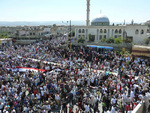Andrew Chadwick and Jennifer Stromer-Galley (Syracuse University) are running a workshop on Digital Media, Power, and Democracy in Election Campaigns next week in Washington DC.
The workshop has been nine months in the making and it is part of the preparation for a special issue of the International Journal of Press/Politics, to be edited by Andrew and Jennifer. This is not an open workshop; it is by invitation only.
The uprisings in Eastern Europe and the Middle East have focused attention on the question of digital media and political power. This has resulted in a wave of research on the relationships between technological change, mobilization, and revolutionary activism in authoritarian and semi-democratic political contexts.
While this research has generated important insights, we suggest that it should now be joined by fresh analysis of the role of digital media in election campaigns. We call for papers for a special issue of the International Journal of Press/Politics that are international or comparative in orientation, that present new evidence, and that connect the study of digital media explicitly with questions concerning power and democracy. We invite authors to examine established democracies both in and beyond the United States and Europe, and in emerging and what comparative regime theorists have termed “difficult democracies” across the world.
Central to the political life of all types of democracies are the organizations, practices, and media technologies of election campaigns, yet we know surprisingly little about the changes that have occurred in this field over recent years. We invite submissions that explore what we see as the increasingly contested issue of the balance of power between political elites, digital media actors, and citizens in election campaigning. Our aim is to orient this project around two classical and fruitfully contested concepts: power and democracy.
We seek submissions that explore continuity and change in the power relations that shape campaigns. We conceive of these power relations in three principal ways. First, we see a need to focus on the internal communication structures of party and campaign organizations. Second, scholars may focus on power relations in the communication flows between party and campaign organizations and the wider constellation of organizations within which citizen participation now occurs. Third, papers may examine the interactions between ordinary citizens and party and campaign organizations.
We primarily seek papers that advance empirical knowledge. Undergirding our interest in these themes, however, is intense normative curiosity about the potential democratizing effects of digital media, not only in relatively “settled” liberal-democratic contexts but also in the globally important difficult-democratic cases that increasingly inform thinking about real-world democracy, such as, for example, Brazil, India, Russia, Mexico, Singapore, Egypt, Turkey, Tunisia, the Balkan states, and parts of central and eastern Europe. Our concern with the difficult democracies emerges because it could be the case that in these political systems important power shifts are more likely.
We would like authors to directly address the question of whether the adoption of digital media is increasing citizens’ influence over the hierarchical organizational structures that have typically dominated parties and election campaigns since the rise of the mass broadcast era. We also want authors to think about conditionality: the balance of forces and causes that shape whether changes in mediated campaigning are democratizing or not democratizing in their effects.
We have no orthodoxy regarding data and methods. We foresee a range of approaches: single country and comparative studies; papers adopting methods of big data analysis; those adopting quantitative approaches; and those situated within qualitative and ethnographic traditions.
Participation in the workshop is not mandatory for consideration for the IJPP special issue. A call for papers for the special issue will follow shortly.
For details of the workshop and to download a paper list, please visit the workshop website here.



